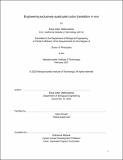| dc.contributor.advisor | Kevin Esvelt. | en_US |
| dc.contributor.author | DeBenedictis, Erika Alden. | en_US |
| dc.contributor.other | Massachusetts Institute of Technology. Department of Biological Engineering. | en_US |
| dc.date.accessioned | 2021-05-25T18:21:06Z | |
| dc.date.available | 2021-05-25T18:21:06Z | |
| dc.date.copyright | 2020 | en_US |
| dc.date.issued | 2021 | en_US |
| dc.identifier.uri | https://hdl.handle.net/1721.1/130813 | |
| dc.description | Thesis: Ph. D., Massachusetts Institute of Technology, Department of Biological Engineering, February, 2021 | en_US |
| dc.description | Cataloged from the official PDF version of thesis. "February 2021." | en_US |
| dc.description | Includes bibliographical references (pages 95-106). | en_US |
| dc.description.abstract | Living organisms universally encode amino acids with three-base codons specifying the twenty canonical amino acids. A genetic code entirely based on four-base codons would answer many questions about the origin of life and have profound implications for expanding the genetic code to include novel amino acids. However, the task of assembling enough quadruplet-tRNAs (qtRNAs) to implement an all-quadruplet code remains a major hurdle. Here, we create qtRNAs that decode canonical amino acids by modifying E. coli tRNAs that continue to rely upon endogenous aminoacyl-tRNA synthetases (AARSs) for charging. We find that AARSs generally tolerate quadruplet anticodons, resulting in efficient, selectively charged qtRNAs for eight of the twenty canonical amino acids, as well as candidate qtRNAs for the remaining 12 amino acids. We develop a directed evolution technique based on Phage Assisted Continuous Evolution and use it to improve the translation efficiency of qtRNAs. In order to address the large number of necessary evolutions, we execute these evolutions using a high-throughput evolution platform we developed. We find that directed evolution of qtRNAs can substantially improve quadruplet codon translation efficiency, often by 10x or more, without compromising amino acid selectivity. We use the evolved qtRNAs to implement an 10-amino acid all quadruplet codon code and processive quadruplet codon translation of a small peptide within a standard bacterial chassis, without the need for genome recoding. | en_US |
| dc.description.statementofresponsibility | by Erika Alden DeBenedictis. | en_US |
| dc.format.extent | 106 pages | en_US |
| dc.language.iso | eng | en_US |
| dc.publisher | Massachusetts Institute of Technology | en_US |
| dc.rights | MIT theses may be protected by copyright. Please reuse MIT thesis content according to the MIT Libraries Permissions Policy, which is available through the URL provided. | en_US |
| dc.rights.uri | http://dspace.mit.edu/handle/1721.1/7582 | en_US |
| dc.subject | Biological Engineering. | en_US |
| dc.title | Engineering exclusively-quadruplet codon translation in vivo | en_US |
| dc.type | Thesis | en_US |
| dc.description.degree | Ph. D. | en_US |
| dc.contributor.department | Massachusetts Institute of Technology. Department of Biological Engineering | en_US |
| dc.identifier.oclc | 1252627401 | en_US |
| dc.description.collection | Ph.D. Massachusetts Institute of Technology, Department of Biological Engineering | en_US |
| dspace.imported | 2021-05-25T18:21:06Z | en_US |
| mit.thesis.degree | Doctoral | en_US |
| mit.thesis.department | BioEng | en_US |
